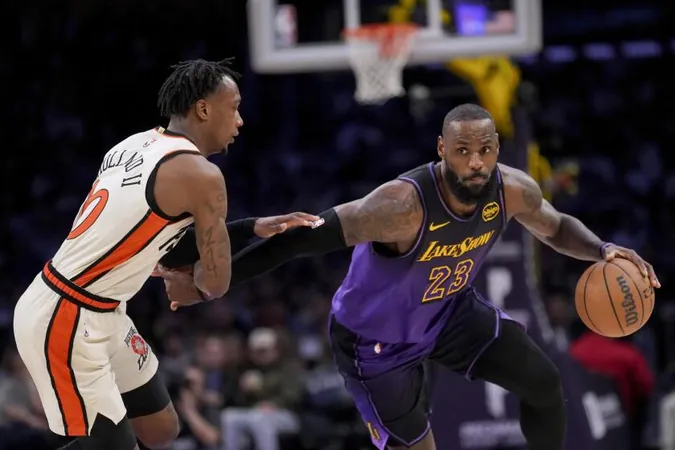
Pistons Hand Lakers a Reality Check in Controversial L.A. Clash
2024-12-24
Author: Ken Lee
In the dynamic world of the NBA, a team's identity often evolves over a season, shaped by experience and performance. This was evident in the Los Angeles Lakers' latest outing against the Detroit Pistons, where their limitations were starkly exposed during a 117-114 defeat in L.A.
At the start of the season, the Lakers believed they needed to outgun their opposition due to defensive shortcomings. However, they seemingly stumbled upon a more coordinated defensive effort, which sparked a series of competitive games. Yet, the question remains: can identity be fully learned, or are there elements that simply must be inherent to a team's DNA?
Throughout the game against Detroit, the Lakers showcased flashes of speed and a bullish mentality. Nonetheless, these qualities appeared intermittent rather than consistent. It became increasingly clear against a physical Pistons squad that the Lakers lacked the requisite size and strength, with their athleticism called into question.
LeBron James, a titan of the game for over two decades, has traditionally embodied the very traits the Lakers struggled to summon. On this night, he found himself outmatched against a younger, more tenacious Pistons team led by Cade Cunningham. Despite Cunningham's inefficient scoring—hitting just 20 points on 25 attempts—his relentless pursuit wore down the Lakers, especially young talents like Max Christie and Austin Reaves.
As the game unfolded, the Lakers faced an uphill battle, trailing by as many as 11 points in the fourth quarter. Despite a late surge that closed the gap to three in the final moments, missed opportunities sealed their fate. Anthony Davis's missed layup, coupled with an overturned foul call, proved pivotal, while James’s last-second three-pointer, aimed at equalizing the game, clanged off the rim.
“It was the look we wanted,” James stated post-game. “We work on these end-of-game situations every day. It just didn’t connect tonight.”
Ultimately, the loss served as a critical litmus test for the Lakers, emphasizing their ongoing quest for balance in both offensive and defensive execution. The positive? They demonstrated scoring efficiency with 14 successful three-pointers—marking their highest output in five games.
However, the Lakers’ offensive woes were exacerbated by their carelessness, resulting in 20 turnovers that gifted the Pistons 28 points in transition. Davis acknowledged this issue, highlighting the need for the team to refine their ball control: “It’s hard to win a game with 20 turnovers. We just have to focus more.”
Reaves had his share of the blame, noting, “They’re a really aggressive defensive team, and I didn’t handle it well.”
While James led the Lakers with a triple-double—28 points, 11 rebounds, and 11 assists—questions loom over the depth of the team. Detroit's bench outperformed the Lakers’, scoring 52 to L.A.'s 28, indicating a potential vulnerability in their rotation.
As the match unfolded, what proved decisive were the little battles—the pressure defense, the physicality in screening, and the tenacity in rebounding. For the Lakers to contend with more robust teams consistently, they must embrace a more physical approach.
James emphasized the need for collective strength moving forward: “There’s no manual for being physical. It’s something you are or aren’t. We need to help each other and utilize our skills effectively.”
As the Lakers continue to navigate their identity crisis, one thing is clear: they must find a way to adapt and thrive in a league where physicality reigns supreme. The journey continues as they strive to solidify their position both offensively and defensively. Will they rise to the challenge, or will they continue to falter when it matters most? Only time will tell.




 Brasil (PT)
Brasil (PT)
 Canada (EN)
Canada (EN)
 Chile (ES)
Chile (ES)
 España (ES)
España (ES)
 France (FR)
France (FR)
 Hong Kong (EN)
Hong Kong (EN)
 Italia (IT)
Italia (IT)
 日本 (JA)
日本 (JA)
 Magyarország (HU)
Magyarország (HU)
 Norge (NO)
Norge (NO)
 Polska (PL)
Polska (PL)
 Schweiz (DE)
Schweiz (DE)
 Singapore (EN)
Singapore (EN)
 Sverige (SV)
Sverige (SV)
 Suomi (FI)
Suomi (FI)
 Türkiye (TR)
Türkiye (TR)